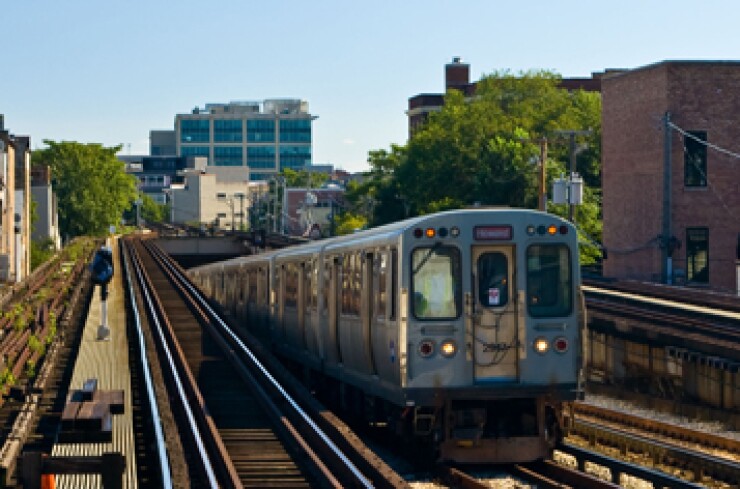CHICAGO – Two Chicago-area transit agencies and their nearly $6 billion of debt took a double-notch rating hit from Moody’s Investors Service, the latest credit fallout from the state’s budget stalemate that is nearing a third fiscal year.
Moody's dropped the Regional Transportation Authority’s $2.2 billion of general obligation sales tax backed bonds to A2 from Aa3 late Tuesday.

The rating agency also lowered the Chicago Transit Authority’s $3.67 billion of sales tax bonds to A3 from A1 and its $67 million of building commission debt to Baa1 from A2. The CTA is one of three service boards that fall under RTA financial oversight.
The outlook on both agencies remains negative.
“The downgrade factors in the repercussions of an extended political impasse in the Illinois General Assembly over how to balance the state's budget,” Moody’s said in its RTA report. After two years of failed negotiations, the state has allowed a backlog of bill payments to reach record levels that is pressuring many public- and private-sector entities awaiting state payments, including the RTA, Moody’s said.
The RTA has managed through the delays by tapping a state-authorized $400 million working cash note authorization. The legislature recently reauthorized the two-year authority that previously had been raised from $100 million. The legislation is awaiting Gov. Bruce Rauner’s signature.
As of Friday, the state was $466 million behind in RTA payments and the cost of its short-term borrowing so far this year is $1.4 million, said RTA spokeswoman Susan Massel.
“Recently, the greatest challenge from our perspective has been late or delayed payments that cause the RTA to float short-term debt to the service boards allowing them to meet cash flow,” Massel said.
Moody’s said the practice, while manageable, is only one measure of potential stress stemming from the continuing financial erosion of the RTA’s two largest related governments - Illinois which it rates Baa3 with a negative outlook and Chicago which it rates Ba1 with a negative outlook.
Those strains will increasingly stress the otherwise strong credit profile of the authority's sales-tax revenue debt. The RTA’s share of sales tax is protected by a legal separation from state coffers although the tax is collected by the state which also provides matching funds.
“Fiscal pressures of the local and state governments” which includes the rising pension burdens of overlapping area governments “will make the city and state more inclined to take adverse actions, such as shifting operating expense burdens onto the transit agencies when possible and the prospects for state capital funding support will be diminished,” Moody’s said.
The negative outlook incorporates the state’s continuing credit deterioration, which threatens to keep exacerbating ongoing aid payment delays in coming months without an agreement to bring the state's revenues and expenditures into closer alignment.
Ahead of a 2016 issue, Fitch Ratings and Standard & Poor's affirmed the RTA’s AA ratings.
In a statement, the RTA sought to highlight that Moody’s noted its rating remains higher than Chicago's and the state government's and that it was the impasse that drove the action.
“The RTA's ratings are critical to the agency's continued ability to secure short and long term borrowing to provide operating funding to the service boards due to state delays and capital funding to supplement federal funding and the lack of a state capital program,” a statement said.
The RTA is planning a $150 million long-term issue later in 2017, chief financial officer Bea Reyna-Hickey said last week.
The RTA operates on a $3 billion operating budget and $5.1 billion five-year capital plan that falls far short of meeting infrastructure demands and lacks a state contribution. The agency has an estimated $19.4 billion of backlogged capital needs to keep its assets in a state of good repair. Total investments of $37.7 billion are needed over the next decade.
“This prolonged impasse is putting pressure on various entities like CTA that are awaiting payment from the state,” Moody’s wrote in the CTA report.
While the practical effects on the CTA have been limited so far, Moody’s said risk is growing over the agency’s exposure because the state collects regional sales taxes that support CTA and other Chicago-area transit providers and provides other forms of supplemental funding. The CTA is also strained by its growing pension burden.
The negative outlook “factors in the Chicago area's economic vulnerability to tax increases needed to address pension liabilities, which could undermine regional sales tax revenues at a time when regional transit providers are trying to address deferred capital investment needs,” Moody’s said.
“We disagree with the rating action taken and do not believe a downgrade was justified," CTA spokeswoman Tammy Chase said in a statement. "The Moody's action, by its own admission, is solely reflective of the state's financial position, and not that of the CTA.”
The statement cited its strong sales tax growth and steady fare revenue and non-farebox revenue growth and the fact that state support flows to the agency based on a formula that is not subject to budget appropriation.





